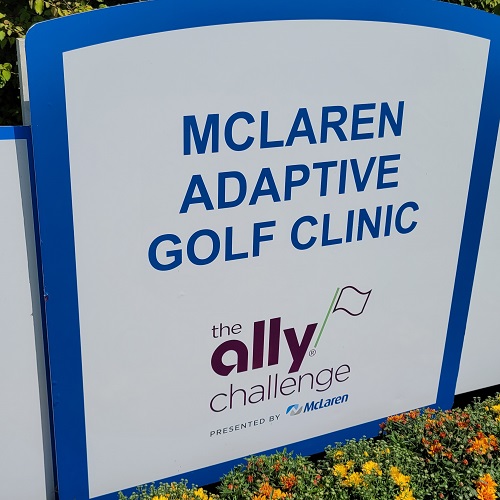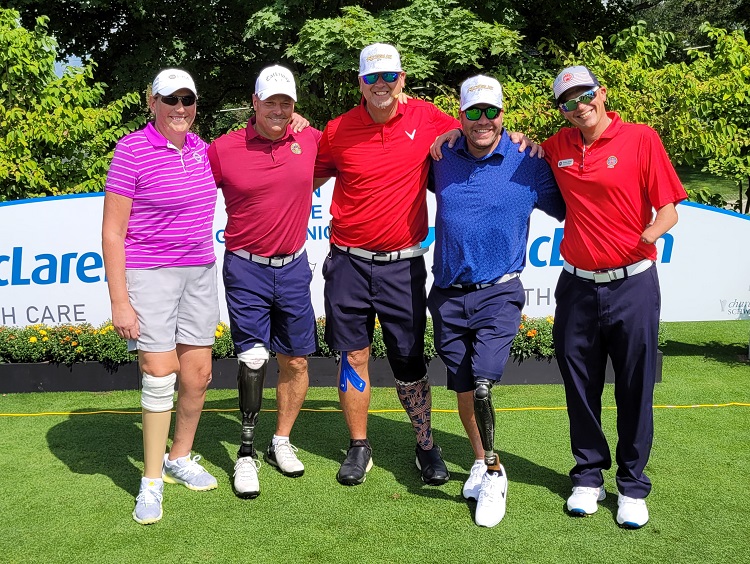
Tracy Ramin knows his mission in life.

Tracy Ramin
His left leg amputated below the knee after a horrible car accident, the life-long golfer thought the game was lost to him.
Instead, what he found was the strength to rededicate himself to the game he loved by adapting to his new reality and striving to motivate others in his position to do the same.
“I was inspired to get people out to play golf,” he said, recalling how just getting back to the game was an immeasurable benefit to him in his recovery.
This is what led him to lead the inaugural McLaren Adaptive Golf Clinic.
Hosted at Warwick Hills Golf & Country Club as a run-up to that week’s PGA Champions Tour Ally Challenge Presented by McLaren, Tracy led an equally dedicated team of coaches in providing tailored swing instructions to golfers with physical disabilities.
“Seeing this event, you really appreciate the many benefits that come with being able to spend a day on the golf course and what it means to the golfer,” said Laurie Prochazka of McLaren Health Care, organizer of the Adaptive Golf Clinic.
“This whole week at the tournament is a celebration of that inclusive nature of golf,” Prochazka noted. “This is what motivated us to organize the event and extend the awareness that individuals with physical disabilities can still enjoy the game through the use of adaptive equipment and techniques. Adaptive Golf is a rising movement in the sport, and we were so pleased to be able to showcase these amazing coaches and participants at our clinic.”
Not far from the smack of the drivers on the range sat Dave and Tim.
Dave, another longtime golfer, was diagnosed with transverse myelitis — a degenerative spine condition — 13 years ago, while Tim, following a neck injury resulting from a fall from a ladder, was told he would never again walk.
Neither ever held out much hope to play golf again, but there they sat, having just met that day and quickly bonding over their shared, unique experiences after hitting a few balls on the range — crediting their intensive physical therapy and the adaptive golf coaches.
“Any time someone can get their independence back, something to put a smile on their face, it’s so good for their recovery,” Tim said. “Never thought I’d get out again, but once I was in physical therapy, I felt better about trying.”

“Hollywood” Kevin Holland
Dave agreed, saying, “It’s just about being around the game.”
For Kevin Holland, though, who was born with cerebral palsy and has limited use of his right arm, he was more about refining his game.
Nicknamed “Hollywood” by friends, Kevin’s history with golf stretches back to when he was 10 years old.
The “high 100s” shooter was introduced to adaptive golf by chance, noticing a one-arm golf swing at a local driving range.
Aware of adaptive golf and working with a coach, Hollywood now posts scores in the high-70s/low-80s, regularly playing in tournaments and traveling to events like the McLaren Adaptive Golf Clinic to further the awareness and continue spreading the word of its seemingly endless benefits.
“It’s inspiring to see,” Tracy says. “When we see a new player, we make sure it’s a big deal for them, and we make sure they know it’s a big deal for them to be out there. We make them feel welcomed — it’s about camaraderie.”

Adaptive golf coaches
This news is republished from another source. You can check the original article here


